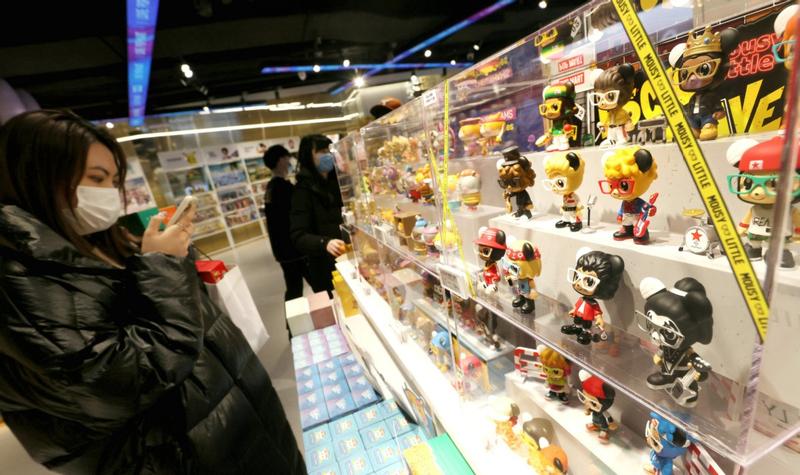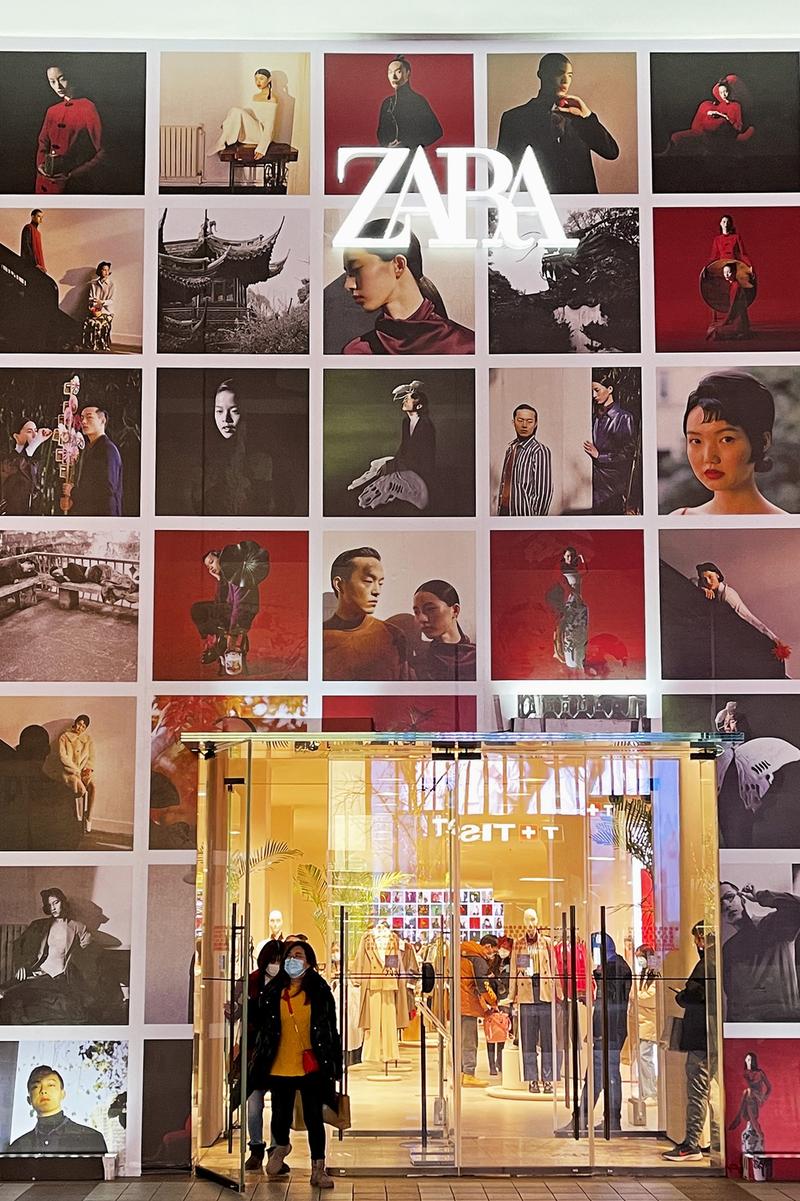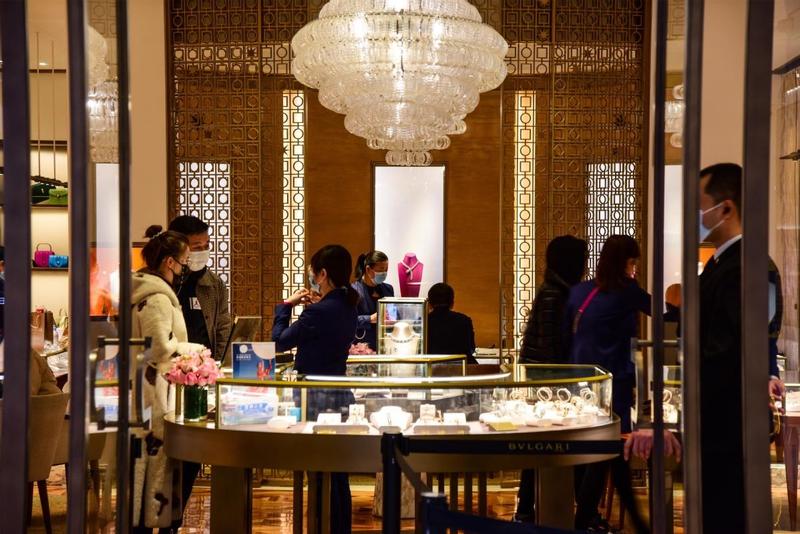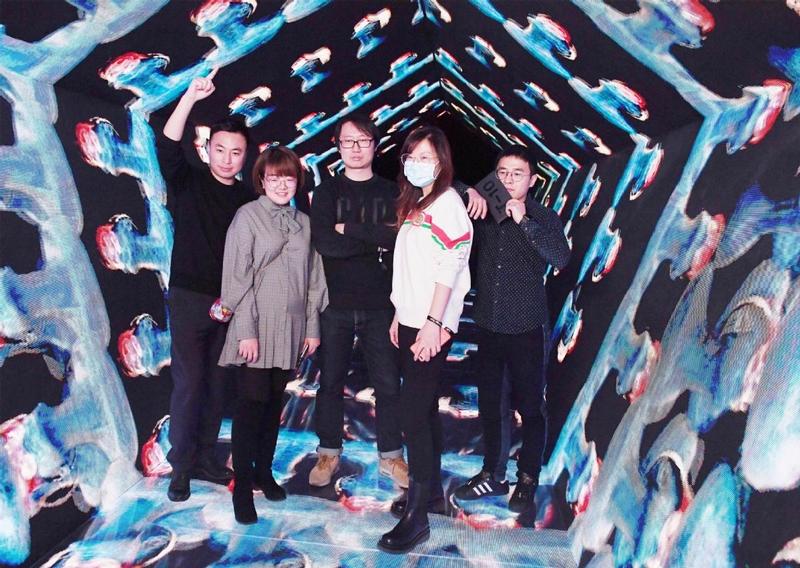 Young customers are attracted by popular Chinese toys at the mall. (PHOTO / CHINA DAILY)
Young customers are attracted by popular Chinese toys at the mall. (PHOTO / CHINA DAILY)
Chen Miao, a 28-year-old bank clerk in Beijing, found to her surprise that her spending last year was double that of the previous year, despite the COVID-19 pandemic keeping her home for almost five months.
Chinese consumers now contribute 35 percent to global fashion consumption, whereas previously only a small proportion of that total came from China.
Xie Dan, deputy general manager, SKP Beijing department store
"Chinese consumers now contribute 35 percent to global fashion consumption, whereas previously only a small proportion of that total came from China."
"I didn't have any major new expenses, such as rent or paying for a car, last year," she said.
"If I had to attribute a reason for the rise in my expenditures, I would put it down to 'revenge spending' during the pandemic, as I had much more time for online shopping from home," she said.
With many businesses failing due to COVID-19, the retail industry, especially high-end players, have been through tough times. However, some of them performed well last year, as they stepped up to the challenge with innovation and services that appealed to customers.
SKP Beijing department store, the nation's biggest and most productive retailer in 2019, saw 15 percent year-on-year revenue growth last year, with sales expected to reach 17.5 billion yuan (US$2.7 billion), the company announced in December.
ALSO READ: Livestreaming is becoming mainstream
The high-end fashion and luxury shopping mall is located in the capital's Chaoyang district, near the central business area, where most foreign companies set up their China headquarters.
Lin Xiaoxiao, 26, a white-collar worker who lives near the mall and often goes window shopping there, said she bought three luxury-brand handbags costing 20,000 yuan to 50,000 yuan there last year because she could not travel overseas due to the coronavirus.
"I used to buy luxury jewelry and bags at duty-free shops when I traveled abroad. The pandemic has made this impossible, so I decided to buy from the department store," she said.
Lin said last year had been "super hard", so she wanted to give herself the best items she could afford.
 A poster for fashion brand Zara adorns a wall outside the company's flagship store at the APM mall in the capital's Wangfujing shopping street. (PHOTO / CHINA DAILY)
A poster for fashion brand Zara adorns a wall outside the company's flagship store at the APM mall in the capital's Wangfujing shopping street. (PHOTO / CHINA DAILY)
"I don't view this as revenge spending, because I've always shopped like this in previous years. I just changed my purchasing channels," she said.
"In addition, I have found that department stores and shopping malls have become more creative than before the pandemic emerged. They seem to be providing more interactive experiences in an attempt to attract and retain customers."
Lin said it costs more to buy the same type of handbag in a department store than at a duty-free shop, but the better shopping environment and service provided by a store compensate for this.
Xie Dan, deputy general manager of the SKP Beijing department store, said China's success in controlling and preventing COVID-19 has created a relatively good business environment for domestic companies.
"Due to the pandemic, SKP has attracted many consumers who used to shop for high-end luxuries overseas," she said.
"Chinese consumers now contribute 35 percent to global fashion consumption, whereas previously only a small proportion of that total came from China."
In 2019, the company opened SKP-S, a new outlet one street away from SKP Beijing. In addition to traditional luxury brands such as Louis Vuitton, Prada and Balenciaga, the new venue boasts niche ones, including Rick Owens, Jil Sander, Stone Island and Moose Knuckles, which are popular among young customers.
SKP Group, the mother company of Beijing SKP, has expanded its market share elsewhere in China.
According to local media reports, on Jan 18, the group signed an agreement to launch a store in Hangzhou, capital of Zhejiang province.
In 2018, the group opened an SKP store in Xi'an, capital of Shaanxi province, its second after the Beijing outlet. Last year, it also launched department store projects in Kunming, capital of Yunnan province, and Chengdu, the Sichuan provincial capital.
Beijing's second-largest shopping center, Chaoyang Hopson One, which occupies an area of 190,000 square meters, has staged a series of promotional activities to boost consumption during the pandemic.
By the end of May, customer flow at the center had returned to the level seen the previous year.
Now, about 100,000 customers a day are visiting the venue-a significant rebound for the center, which is reshuffling the brands it stocks.
To broaden visitors' shopping experience, the company has introduced new energy cars, designer clothing for children and a fitness training center.
 Customers shop at the SKP Beijing department store. (WANG SHIQIANG / FOR CHINA DAILY)
Customers shop at the SKP Beijing department store. (WANG SHIQIANG / FOR CHINA DAILY)
Going digital
Zhang Xi, a VIP member of Chaoyang Hopson, said she uses the shopping center's app for its promotional activities.
"At first, I just downloaded the app to pay my parking fees when I went to the center, but I gradually discovered many interactive games, promotional events and e-vouchers on it, which are very useful," she said.
"I use the vouchers to take free piano lessons, gym classes and oil painting lessons at the center. I can spend a whole day there, dining, shopping, attending art sessions and watching a film after booking in advance through the app."
As a result of the pandemic, most shopping malls have strengthened their online services to attract additional revenue and customers.
Zhang said she exchanged her consumer points on the Chaoyang Hopson app for cosmetics, which were delivered to her home.
"It was a nice experience, which makes me want to visit the center more," she said.
Last year, Ikea, the Swedish furniture giant, launched its online app in China, offering a range of promotions from its physical stores, which have attracted many customers, including Zhang.
"I used to go to Ikea's Siyuanqiao store in Beijing quite often, but I now shop at the company online, as it saves me so much time. Also, the store is always crowded," she said.
Zhang Ying, saleswoman for a jewelry brand at Chaoyang Hopson One, often adds customers as her friends on WeChat, with the aim of providing better service and communication.
She posts photos of products on her account each day and answers questions from customers via the app.
"I have to do mobile promotion to build bridges between customers and the brand I work for," she said.
"There is now no clear line between online and offline sales. We use all the tools we can to attract customers. I make friends with them, provide them with service and make money for both the brand and myself."
Shopping centers have also turned to livestreaming sessions during the pandemic.
In Beijing, to boost consumption, the commerce bureau has organized several such broadcasts for traditional food and clothing brands. The sessions have proved popular.
On June 6, the bureau staged livestreaming events to mark the start of the summer spending season, raising revenue of 1.4 billion yuan by staging such broadcasts until the end of last year.
In November, more than 300 companies in Beijing joined a livestreaming contest to introduce their products to customers via apps, with more than half the participants taking part in such broadcast for the first time.
Innovative experience
In September, the commerce bureau in Beijing introduced measures to encourage the launch of flagship stores in the capital, entitling brands to subsidies for store decoration and rent.
Last year, the capital saw 31 flagship store launches from international brands, according to the China Office and Business Park Tenant Profile 2019 Beijing released recently by real estate services company CB Richard Ellis. Catering businesses comprised 32 percent of the brands launching in the city.
At the end of last year, English Premier League soccer club Manchester United launched its entertainment center, Theatre of Dreams, at Beijing Fun, south of Tian'anmen Square.
The three-floor, 3,800-square-meter venue comprises an experience center with interactive games, along with the world's largest Manchester United franchise store, where fans can buy genuine accessories from the club.
Store launches have proved effective in giving customers new experiences and with helping businesses recover.
 An art exhibition opens at the SKP Beijing store in December. (YAN TONG / FOR CHINA DAILY)
An art exhibition opens at the SKP Beijing store in December. (YAN TONG / FOR CHINA DAILY)
For example, last year, Apple opened its new flagship store in Sanlitun, one of Beijing's busiest and most fashionable areas, while niche fragrance brands Kilian, Maison Boucheron and Tiffany launched boutique stores at Beijing SKP.
Feng Lin, a middle-aged Beijing mother with a 3-year-old daughter, said, "After staying home for several months, I started to reflect on my shopping habits.
"I can buy almost everything I require online. Staying home didn't affect my consumption or daily needs. However, during the pandemic, I badly wanted to visit a spacious, gleaming shopping mall with beautiful items on display and to savor the aroma from coffee shops.
"This experience matters. It makes me feel good when I go to a shopping center and have the time to relax and enjoy life."
Department stores and shopping centers have worked hard to provide such experiences, especially since the pandemic started.
In December, high-end commercial building operator Beijing Yintai Property Co, which is based in the capital's central business district, allocated space on its second and third floors for artists to display their work, with the aim of attracting more customers.
This space at the Beijing Yintai Center, named Yuan Living, was launched by the company and the Yuan Art Museum to bring beauty to consumers and integrate art, design, business and life.
Visitors can see and even touch artworks that include furniture, clothing, paintings and jewelry made by domestic artists and designers.
Xu Daichuan, deputy general manager of Yintai Property Co, which owns the center, said the company believes art is an important part of business and can enrich customers' shopping experience.
"We also want to provide more space and opportunities for domestic artists to show their talent. It's a win-win project and the space is allocated to artists for free," he said.
Many shopping centers in Beijing, including Parkview Green, Beijing SKP and Sanlitun, have turned to staging free art exhibitions.
Xu said, "It's about creating a space for customers, not just selling things."
Consumption power
As retailers continue to go digital and provide a better experience for customers, shoppers have also contributed greatly to the economy, thanks to their rising incomes.
Beijing residents are earning more than before, with per capita disposable income in 2019 ranking second among China's municipalities and provinces, according to the city government.
READ MORE: Customers put Sanlitun back on the menu
Per capita disposable income in the capital in 2019 reached 68,000 yuan, up from 48,000 yuan in 2015, representing average annual growth of 6.6 percent, according to Lin Enquan, deputy head of the Beijing Development and Reform Commission.
The upcoming opening of Universal Studios Beijing, and the Winter Olympics next year, are expected to further inspire Beijing retailers and attract more customers.



